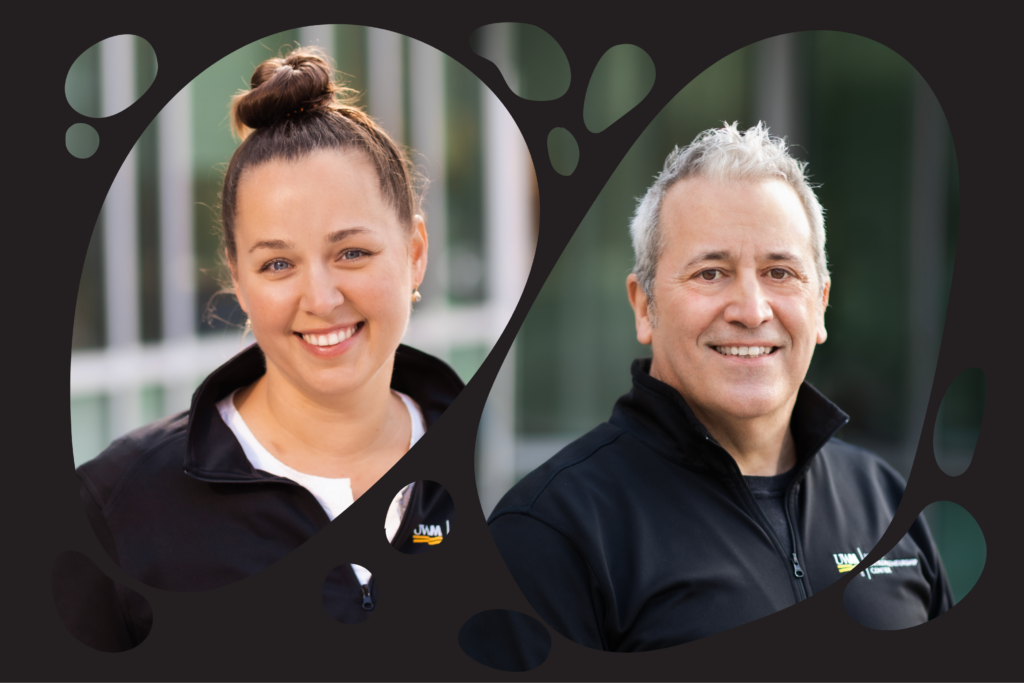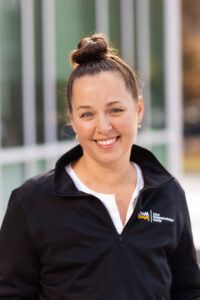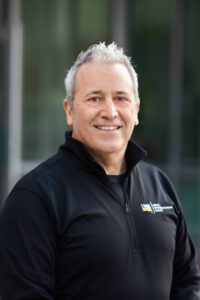
At the Lubar Entrepreneurship Center, innovation goes further than business and coffee. Social innovation is critical to a healthy community and a healthy mindset, and this month the LEC wants to shed light on two members of our team who especially embody these ideals. Amelia Coffaro, our Well Entrepreneur-In-Residence and head of our Well Entrepreneur program, and Mark Fairbanks, our Entrepreneur-In-Residence of Social Innovation and host of Social Good Morning, are constantly making strides to be leaders in social wellbeing and innovation.
We sat down with Amelia and Mark to ask them about their journey, their experiences, and what they learned. This is what they had to say:
Hi Amelia and Mark, please tell us a little bit about your background.
 Amelia Coffaro: My background is in photography and video production, but over the last 10 years I’ve been working as a yoga therapist in an oncology center. I work with people across the cancer continuum (prevention to end of life) both in a classroom setting and one on one in the chemotherapy infusion center, teaching mindfulness, self compassion, meditation, relaxation and breathing practices. My work focuses on using mind body medicine as a way to meet the unique needs of each individual and help manage or alleviate the physical, mental and emotional side effects of a cancer experience.
Amelia Coffaro: My background is in photography and video production, but over the last 10 years I’ve been working as a yoga therapist in an oncology center. I work with people across the cancer continuum (prevention to end of life) both in a classroom setting and one on one in the chemotherapy infusion center, teaching mindfulness, self compassion, meditation, relaxation and breathing practices. My work focuses on using mind body medicine as a way to meet the unique needs of each individual and help manage or alleviate the physical, mental and emotional side effects of a cancer experience.
 Mark Fairbanks: I’m co-founder and Executive Director of Islands of Brilliance, and Entrepreneur in Residence for Social Innovation here at the LEC. For 10 years, Islands of Brilliance has been pioneering the use of art, creativity, and creative technologies to spur self-confidence, independence, and pathways to employment for autistic individuals.
Mark Fairbanks: I’m co-founder and Executive Director of Islands of Brilliance, and Entrepreneur in Residence for Social Innovation here at the LEC. For 10 years, Islands of Brilliance has been pioneering the use of art, creativity, and creative technologies to spur self-confidence, independence, and pathways to employment for autistic individuals.
What was the origin of your interest in social innovation?
Coffaro: Ten years ago I was diagnosed with a rare and aggressive form of breast cancer at age 27 and was told I had a less than five percent chance of living two years past the diagnosis. I later learned I have a rare genetic mutation that puts me at a very high risk for multiple kinds of cancer throughout my life. At the time, I had to learn how to adapt my yoga practice to meet a lot of the unique challenges I was experiencing because every yoga studio I went to couldn’t meet these needs. The longer I was in the cancer community, the more I realized others who had the same needs and were interested in using yoga and mindfulness for support but didn’t know where to go. More importantly and interesting, I learned that very often the illness itself is the least of a person’s worry because of so many other additional cultural and societal factors they were dealing with. This is really when I started to see yoga and mindfulness as tools for social justice and change in and out of healthcare.
These experiences have taught me the tremendous power of not only living in the moment, but that anything is possible. Interestingly, my experience at the LEC and learning about entrepreneurial thinking has reminded me of these lessons time and time again. I love to joke that I came to the LEC with a business idea around mindfulness, but really my experiences here taught me about mindfulness in a way.
I am deeply grateful for the support of my friends, family, mentors, colleagues and community — I would not be here doing this work without each of them.
Fairbanks: Honestly it began way back in 2007. I was a Creative Director for an advertising agency in Minneapolis. I had a very successful creative career, but I had that existential moment when I thought to myself “Is this all there is? Couldn’t I do something more with my talent?” I had never heard of design thinking or social innovation—I don’t even know if it was a “thing” back then. I just had a desire to use creative processes to impact the world in a positive way.
Where did the idea for Social Good Morning originate from?
Fairbanks: I really loved what Creative Mornings was doing here in Milwaukee and around the world. It was a really fun, vibrant format. I wanted to create the same kind of vibe, but bring in speakers who were creating a positive impact in Milwaukee that UWM students, faculty, and the broader community would find interesting. The format has evolved over the years, and I think we’re always looking to create memorable experiences that attendees will share and talk about after the event. I love the collaborations I’ve been able to do with Amelia, and I so value how we’ve been able to integrate mindful moments and the importance of wellbeing into our experiences here at the LEC.
How have you bridged the gap between wellness and entrepreneurship?
Coffaro: The principles and practices of mindfulness and meditation are very similar to entrepreneurial thinking and the entrepreneurial process — namely, learning how to pay close attention, release expectation to outcome, and the willingness to begin again and again. I’ve been focused on applying and integrating those concepts into our programs here at the LEC, more specifically as it relates to Lean Launch Methodology. I also focus a lot on educating on the practice of self-compassion and why/how being kind to ourselves along the path of entrepreneurship has real well-being benefits.
What socially innovative projects have you been working on?
Coffaro: I came to the LEC with an idea and vision to make mindfulness and yoga accessible to people in underserved populations — serious illness or specific chronic disease, veterans, neurodiverse, deaf and blind, BIPOC, and LGBTQ to name a few. Evidence based, mind body practices are shown to ease stress & improve health outcomes, but not all practices and spaces to practice are shared in a way that people can benefit the most. Mindfulness, meditation and yoga are more effective when combined with an understanding of a person’s unique physical & psychosocial needs. My goal is to connect teachers trained to work with special populations and underserved communities, to create safe and supportive healing environments in a way that mainstream wellness offerings do not. Since Covid, I’ve been slowly working on ways to pivot my original idea to one that can best serve people during these most interesting times.
I’m also focusing on creating a concept that integrates cognitive behavioral therapy, mind body medicine and peer support to support the mental health of adolescent young adults with cancer.
What has been a challenge you have encountered during your journey with social innovation? How did you overcome it?
Coffaro: The biggest challenge for me has been learning to let go of an idea I hold tightly to or really, really believe in, and to trust the process… which is ironic because I practice and teach mindfulness and meditation. Ha! This journey has reminded me that sometimes when we indeed let go and practice non attachment, new opportunities and possibilities can open up in ways we may never even imagine. That’s exciting to me!
What is the most valuable lesson you learned from your experiences with Islands of Brilliance and Social Good Morning?
Fairbanks: Honestly, social entrepreneurs are driven by values. We all have that in common, and I’ve drawn so much from that. It’s made me asset map my own set of values, and that’s what really led to the Model Entrepreneur Compass/Gyroscope framework I’ve been working on with the LEC team.
What piece of advice would you like to share with students who are interested in entrepreneurship and innovation? Is there anything else that you want to highlight?
Coffaro: Right now a lot of my work is focused on trying to find innovative ways to serve the adolescent young adult (AYA) cancer community through integrative medicine. In addition to facing key developmental life milestones, AYAs also face a number of health disparities and quality of life issues related to cancer that can affect disease outcome, survival rates and coping with the distressing side effects of cancer. As a result, a growing number of AYAs report access to adequate mental health resources as a top, unmet need to manage cancer related morbidities such as anxiety, depression and post traumatic stress. There are large gaps particularly for AYA cancer survivors after they end treatment and enter survivorship.
I’m really excited to be applying skills I learned in I-Corps and entrepreneurial thinking in some of my work with colleagues at Harvard and The Society for Integrative Oncology to find ways to bridge these gaps, meet a need, and support young people in flourishing as they navigate the many challenges in life after cancer.
Fairbanks: Patience. Our culture and media constantly promote overnight success stories. I’m sure those happen, but often it’s a very long road to success, complete with twists and turns and moments of doubt. Patience is really an undervalued asset.